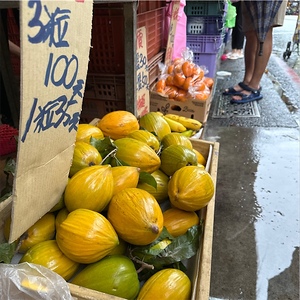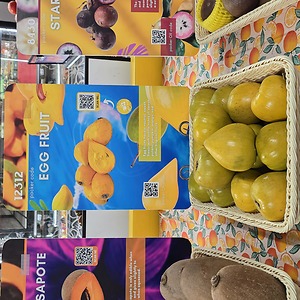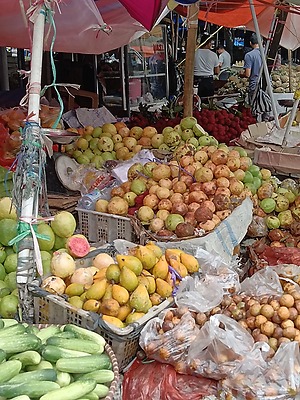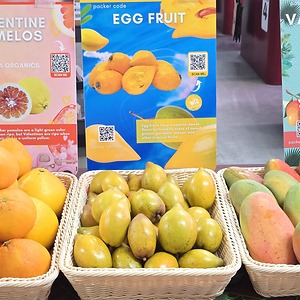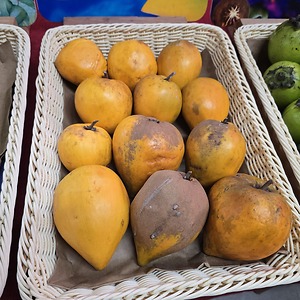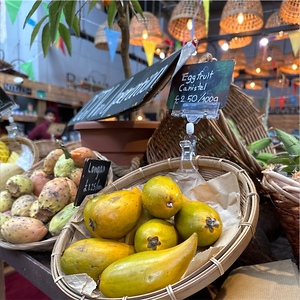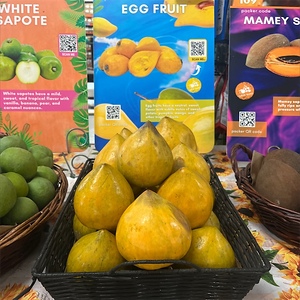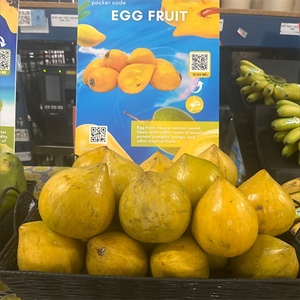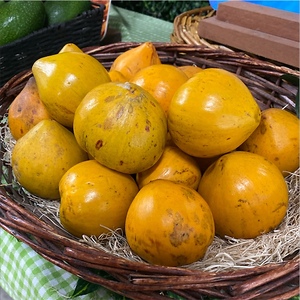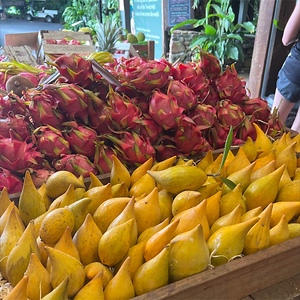


Egg Fruit
Estimated Inventory, lb : 0
This item was last sold on : 06/28/25
Description/Taste
Egg fruits are small to medium in size, averaging 7 to 12 centimeters in length, and have an oblong to bulbous, curved shape, sometimes tapering to a point on the non-stem end. The skin is smooth, thin, easily punctured, glossy, and waxy, ripening from green to a golden, yellow-orange hue. The skin is also occasionally covered in rust-brown patches, which is not an indication of the quality of the fruit’s flesh. Underneath the surface, the flesh is dry, bright yellow to orange, creamy, and thick with a smooth, crumbly texture reminiscent of a hard-boiled egg yolk. The flesh also contains 1 to 4 hard, black-brown seeds and emits a pronounced musky, squash-like aroma. Egg fruits have a neutral, sweet flavor with subtle notes of sweet potato, pumpkin, mango, and other tropical fruits.
Seasons/Availability
Egg fruits are available in the fall through winter.
Current Facts
Egg fruits, botanically classified as Puteria campechiana, are an unusual, tropical to subtropical fruit found on an evergreen tree that reaches up to 8 meters in height, belonging to the Sapotaceae family. The bright yellow-orange fruits are favored for their distinct, creamy texture, and the name Egg fruit is derived from the fruit’s similarity in consistency to a hard-boiled egg yolk. Egg fruits are also commonly known as Canistel fruits and are a close relative of the well-known tropical fruit, sapota, or sapodilla. In addition to Canistel, the fruits are sometimes known as Yellow Sapote and are referred to by many other regional names worldwide. In the modern-day, Egg fruits are cultivated on a small scale, mainly in Central America, the Caribbean, and Southern Mexico, and the fruits must be harvested by hand to protect the delicate skin. Within these regions, the fruits are valued for their late fall and winter ripening time, providing fresh fruits during a season that historically has limited fruit availability.
Nutritional Value
Egg fruits are an excellent source of beta-carotene, a pigment found within the flesh that is converted into vitamin A in the body to boost the immune system and protect against vision loss. The fruits are also a good source of calcium and phosphorus to strengthen bones and teeth and contain iron to produce hemoglobin to transport oxygen through the bloodstream.
Applications
Egg fruits are best suited for both fresh and cooked applications, including baking and simmering. The fruit’s soft and thick flesh can be consumed straight, out-of-hand, sprinkled with salt and lemon juice, or it can be crumbled over salads, spread onto toast, or sliced and dipped in chocolate. Egg fruits can also be mashed with spices and stuffed into mushroom caps as a creamy filling, blended into salad dressings, combined with herbs to make a sandwich spread and dip, or mixed with almond milk or soy milk to make a shake-like beverage. During the holiday season, Egg fruits are popularly blended with milk, nutmeg, cinnamon, and vanilla to make a vegan “eggnog.” Beyond fresh applications, Egg fruits retain their dense texture and flavor when heated, allowing the flesh to be used as a thickening substitute in soups, curries, bread, and pancakes. The flesh can also be incorporated into baked goods and desserts such as cheesecakes, pies, cakes, and ice cream. Egg fruits pair well with spices such as allspice, coriander, cinnamon, nutmeg, thyme, and turmeric, vanilla, maple syrup, honey, nuts such as almonds, pecans, and walnuts, and fruits such as oranges, limes, coconut, bananas, durian, and jackfruit. Egg fruits will continue to ripen off the tree and should fully ripen at room temperature. Depending on when the fruit was harvested, ripening will take between 3 to 10 days. Once ripe, the fruits should be immediately consumed or stored in the refrigerator. The pulp can also be mixed with sugar and frozen for up to 6 months.
Ethnic/Cultural Info
In 2014, Egg fruit was 1 of 71 ingredients in a custom cocktail created to celebrate the Commonwealth Games in Glasgow, Scotland. The Commonwealth Games are a series of athletic competitions held every four years between countries included in the British Commonwealth. Countries from Africa, the Caribbean, the Americas, Asia, Europe, and the South Pacific participate in the games, and there are over 18 events, including swimming, rugby, wrestling, cycling, lawn bowling, volleyball, basketball, rowing, and boxing. To commemorate the games in Glasgow, Bartender Mal Spence of Kelvingrove Café chose an ingredient from each of the participating countries and combined them into a single cocktail. Spence conducted over 300 variations and trial runs of the cocktail until he felt it was perfected. The scotch-based cocktail exuded floral, fruity, and delicate notes and was created to promote the games through a unified drink. Egg fruit was included in the specialty cocktail as the representative fruit from the Bahamas.
Geography/History
Egg fruits are native to tropical, subtropical regions of Southern Mexico and Central America, specifically Guatemala, El Salvador, and Belize, and have been growing wild since ancient times. The fruits were consumed by the Mayans and Aztecs and were later introduced to other regions of Central America, the Caribbean, and the Florida Keys. Egg fruits were also brought to Asia and Southeast Asia sometime before the mid 20th century, but the fruits never became widely accepted, primarily localized to home gardens where they are sold as small specialty fruits in fresh markets. Today Egg fruits are cultivated in Mexico, Guatemala, Costa Rica, Panama, Nicaragua, Cuba, Jamaica, Florida, the Bahamas, Belize, and El Salvador, sold through specialty grocers and markets. The fruits are also found in India, Cambodia, the Philippines, Vietnam, Sri Lanka, Indonesia, and Australia.
Recipe Ideas
Recipes that include Egg Fruit. One
| Bitter Sweet |
|
Eggfruit Lemon Curd |



